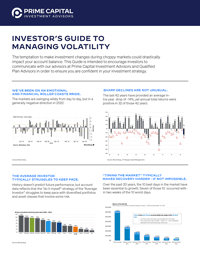So you’ve met someone you like, like really like. You’re already hearing wedding bells and thinking of marriage with a baby carriage. While being in love is awesome, you need to pause long enough to vet your future spouse and make sure you’re not just compatible because you both like the same ice cream and like the same movies, but because your values align, one of the most important being finances.
Financial compatibility is just as important as aligning religion, family plans, and future dreams. In fact, financial planning typically serves as a basis for at least the latter two. So how do you know if you’re financially compatible with your partner? How can you avoid getting attached to someone you’re not compatible with while also not scaring them off with heavy financial questions in the beginning? We’ve been there, and we’ve had clients who’ve been there. Here are our tips for navigating a financial conversation with someone you’re thinking you could see yourself spending the rest of your life with.
When Do I Know it’s Serious Enough to Bring Up the Topic?
While every relationship has its own unique set of milestones, there are some generalizations that could help indicate it’s more serious than just a fling. Timing in these conversations matters—too early can be unnecessary, but waiting too long can lead to disastrous surprises. If personal items, like toothbrushes and clothes, are left at each other’s places, that’s a potential indication it’s a more serious relationship. A big sign to have the finance talk is if either of you starts influencing the other’s purchasing. For example, if a partner is involved in financial decisions like furniture purchases, it’s probably time to talk.
How Do I Approach the Conversation?
Money can be somewhat of a taboo topic, even among couples. But there’s a way to ask these questions while making sure you’re not giving your partner the third degree. You can start incorporating money conversations naturally into everyday discussions. This can be you talking candidly about your approach to finances as well as open-ended questions. Here are some questions that might help you jump-start the conversation, depending on exactly what you want to talk about:
Money Mindset & History
- What was your experience with money growing up?
- How did your family talk about (or not talk about) finances?
- What’s one lesson about money that has stuck with you?
Spending & Saving Habits
- Do you consider yourself more of a saver or a spender?
- How do you decide when to splurge on something?
- Do you use a budget or track your expenses?
Debt & Financial Responsibilities
- Do you have any outstanding debt (credit cards, student loans, etc.)?
- How do you feel about using credit cards or financing purchases?
- Have you ever had to make a major financial sacrifice?
Income & Career Goals
- What are your financial priorities right now?
- Where do you see your career (and income) in five or ten years?
- Would you ever consider changing careers for financial reasons?
Lifestyle & Financial Compatibility
- How do you feel about sharing finances in a relationship?
- How important is financial independence to you?
- Do you think couples should merge finances, keep them separate, or do a mix of both?
When they’re answering your questions, it’s a good time to reflect on what you’ve observed in their financial habits, from how they spend to how they save. For example, if they say they don’t spend a lot on groceries, but you go to the grocery store with them and see they spent four times your normal grocery budget, that’s a great opportunity to ask, “Is this not spending a lot of on groceries to you?” This helps make sure there are no discrepancies between you two and that you’re both on the same page. Before making any long-term commitments, you need to make sure you understand each other’s financial past, mindset, and goals.
How Do I Know We’re Compatible?
This can be the tricky part, especially if you really like the person. You may have a knee-jerk reaction to dismiss red flags as minor discrepancies. These conversations are the time to make sure you’ve taken off the rose colored glasses and to do your best to see things as they are. If you know you want to save to travel all your retirement, but your partner wants to stay local with future grandkids— that’s a potential red flag. If you know you want to buy a home one day, but your partner is perfectly content to continue renting the rest of their life— that’s a potential red flag.
Remember how earlier we said that finances lay the framework for compatibility in family planning and future dreams? Well, the financial conversation usually ends up revealing how compatible, or incompatible, you and your partner are in those areas as well. Going back to our example, maybe you want to save to travel in retirement because you don’t plan on having kids, while your partner’s dream is to not only have kids, but spend a lot of time with them. That’s not just a financial incompatibility, it’s a lifestyle incompatibility. And while neither of you are wrong for what you want, it would be wrong to try to coerce the other person into doing something they know they don’t want.
Be thoughtful in these conversations and honest about what you’re willing to compromise on, and encourage your partner to do the same. If the conversation ends in an understanding and you feel more aligned, then you know it’s a relationship with future potential. If the conversation ends in more questions than answers, at the very least, that’s something to follow up on. If you keep feeling confused or at ends with your partner over these very important topics, that might be a sign they are not the one, and that’s okay.
These conversations can be tricky at best and downright uncomfortable at worst, but if you and your partner get through these conversations, you’ll come out on the other side as a stronger, more aligned couple. With tactfulness and a good sense of knowing what you want, and don’t want, in your financial future, these conversations won’t be as hard to facilitate. At the very least, your future self will be grateful you had the courage to confront a difficult topic head-on.
If you think you think you found the one but aren’t sure about financial compatibility or need help defining your financial compatibility, we are here to help! Give Jason Noble a call today at (843) 743-2926 or call Andy Merchant at (316) 669-9413 to take the first step toward designing a portfolio tailored to you.
This article is for general information only and should not be considered as financial, tax or legal advice. Prime Capital and its associates do not provide legal or tax advice. Individuals should consult with an attorney or professional specializing in the fields of legal, tax, or accounting regarding the applicability of this information for their situations.
Advisory products and services offered by Investment Adviser Representatives through Prime Capital Investment Advisors, LLC (“PCIA”), a federally registered investment adviser. PCIA: 6201 College Blvd., Suite#150, Overland Park, KS 66211. PCIA doing business as Prime Capital Financial | Wealth | Retirement | Wellness.
MTM-700887-2025-03-10





